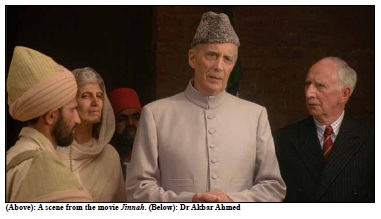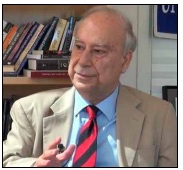Jinnah Screened on Mainstream American TV Network
By Raza Rumi


Q: The screening of the Jinnah film on a mainstream American TV network must be a moment of pride for you. What is the significance of this event?
Yes. I was especially pleased on seeing Jinnah broadcast on Turner Classic Movies (TCM) a few weeks ago. The film had finally reached the shores of the United States. The significance of TCM is that it shows the great classics of world cinema such as Casablanca and Gandhi . Christopher Lee, who passed away last year, called this his best performance, and would have been proud to see Jinnah now broadcast for mainstream America. I am grateful to all the many friends, supporters, cast and crew who spent years working on Jinnah. I am sure it was a proud moment for all of them. I would especially like to congratulate Jamil Dehlavi who directed the film.
You can imagine my own feelings on seeing Jinnah on TCM, which took me back some three decades to Cambridge University when I first began planning a film project on the Quaid. At that time, I had launched four related projects for the 50th Anniversary of Pakistan in 1997: the feature film Jinnah , a documentary called Mr Jinnah: The Making of Pakistan , an academic book, Jinnah, Pakistan and Islamic Identity and The Quaid , a graphic novel. This was the Jinnah Quartet. It has been a long journey.
Q: In the current India Pakistan tensions, the issue of Kashmir has once again come into spotlight. How was your experience of handling that subject in the film?
My aim in the Jinnah films, both the feature and documentary, was two-fold: to tell the story of Jinnah, the man, and through that the “why” of Pakistan and its birthing problems around the issue of Kashmir. There is a scene in Jinnah in which Christopher Lee, as Jinnah, clearly explains the genesis of the problem. He points out the basic facts that are forgotten by the world media: that the basis of the division of the states of India in 1947 was Muslim-majority states going to Pakistan and Hindu-majority states going to India. As Kashmir was 80% Muslim it was always assumed that Kashmir would go to Pakistan. Jinnah calls it the “jugular vein of Pakistan”. Jinnah points out that Lord Mountbatten was involved in Indian troop movements into Kashmir. But ultimately, the Kashmiris should have the right to decide about their future.
Coming back to Jinnah, it also exposes how the international border between India and Pakistan was straightened so that the Muslim-majority district of Ferozpur, which would have given Pakistan its only arsenal, was moved over to India on the orders of Lord Mountbatten. This information was given to me by Christopher Beaumont himself, who was Secretary to the Boundary Commission. I arranged for his interview in the Jinnah documentary.
Q: The US media sympathizes with the Indian position that Pakistan-based militias carry out terror attacks…
There is little doubt that India’s vastly bigger media presence on the global stage allows it to project its point of view more effectively than Pakistan’s media. Pakistan has taken some initiatives such as “special envoys” touring the United States to explain the Kashmir problem. They have a compelling case. Some solution has to be urgently found for the long-suffering people of Kashmir.
 The problem with such VIP visits is that they make minimum impact outside Pakistani circles. I didn’t see any coverage on CNN, Fox, MSNBC etc. Such visits should be designed to interact with audiences in townhall meetings, campuses, press and mainstream media. Unless non-Pakistanis are convinced that the vision of Pakistan that its founder had was based on human rights, women’s rights, minority rights and the rule of law they will invariably be swayed by the media associating it with terrorism. India’s success in projecting itself on the global stage was helped by the Gandhi film. The Jinnah Quartet was conceived and completed for pedagogical and intellectual reasons while I was at Cambridge University. I hoped to do for Jinnah what Gandhi did for Gandhi.
The problem with such VIP visits is that they make minimum impact outside Pakistani circles. I didn’t see any coverage on CNN, Fox, MSNBC etc. Such visits should be designed to interact with audiences in townhall meetings, campuses, press and mainstream media. Unless non-Pakistanis are convinced that the vision of Pakistan that its founder had was based on human rights, women’s rights, minority rights and the rule of law they will invariably be swayed by the media associating it with terrorism. India’s success in projecting itself on the global stage was helped by the Gandhi film. The Jinnah Quartet was conceived and completed for pedagogical and intellectual reasons while I was at Cambridge University. I hoped to do for Jinnah what Gandhi did for Gandhi.
Q: In mainstream media, Pakistan is only viewed through the security lens. Have Pakistanis made an effort to present the diversity and complexity of the country?
After I joined American University in 2001, I have been regularly on the road lecturing about Islam and Pakistan. My audiences are always pleasantly surprised when I tell them of the range of societies found in Pakistan, from the Kailash in the north to the Makranis of Gwadar – which, when I was Commissioner in Makran in the 1980s, was a tiny obscure port with links to the Arabian Peninsula and beyond to Africa, and where Alexander got lost on his way back from India.
I also point out the extraordinary leadership provided by female Pakistanis like Benazir Bhutto, the first female prime minister of a Muslim country, and Malala Yousufzai, the youngest winner of the Nobel Peace Prize. Hundreds of thousands like these two carry the modernist vision of Islam and that gives me hope.
Yet we cannot escape the reality of Pakistan today and the all-too-frequent acts of violence. As a former district administrator in charge of law and order, I strongly urge Pakistani leaders to condemn and effectively challenge the scourge of militant violence. The violence is all-pervasive and horrific – schoolchildren, lawyers and passengers in buses, no one is safe – and must be stopped at all costs. Pakistan cannot allow such acts to occur with such frequency and then simply blame them on “outside agencies.” It risks isolation and being branded as a terrorist state.
Q: There is a substantial and somewhat influential diaspora in the US. Why have they been unable to influence public narratives here?
I have met dozens of successful Pakistanis who have achieved the American dream. The Association of Pakistani Physicians in the US is said to number about 20,000. There are also successful Pakistanis in business and government. Pakistanis have also shown their compassion in acts of philanthropy and social work. There are even certain individuals, like Faran Tahir, who have made their mark in Hollywood. There is a problem, however. Just as in Pakistan, the community here tends to think less in terms of one over-arching identity and more in terms of particular ethnic or political alignments. Added to this is the lack of leadership. So the lack of unity and leadership tend to cancel the success of individuals in the US.
In addition, the next generation has been encouraged to become lawyers and doctors in order to make money. Given their potential, there are very few Pakistanis in the media, teaching on campus or writing columns in the main newspapers. As a result, the Pakistani community does not punch in its weight. It is therefore easily defined by others. When the community’s critics suggest it is linked to a terrorist state back home it finds it difficult to respond given its lack-luster performance in wider society. Pakistanis must encourage the next generation to invest in professions which make an impact on the larger community.
Q: Since you have also served as Pakistan’s envoy to the UK, what concrete steps you would suggest for our missions abroad?
Considering the troubled time Pakistan is passing through it is imperative that members of Pakistan’s missions abroad are able to explain what is at stake both to their host governments and societies and also to their own diaspora communities. The missions should work closely with the community to set up community and media centers for outreach. Better use of the local community needs to be made. Among the new initiatives, I would strongly recommend arranging media training for Pakistani diplomats posted abroad. Speaking clearly and with well-organized notes is an art. Pakistanis are too prone to ramble on and once they get the mike and wander away from the topic at hand. Similarly, they must be coached in appearance, dress and etiquette. Most important, they must be punctual. “Pakistani time” does not prevail everywhere and people get offended if people violate agreed times.
In addition to diplomats, the visits of artists, singers and writers should be arranged in numbers. The impact of Jimmy Engineer and his paintings, for example, was enormous as he exhibited on American campuses and art galleries. The embassy could work to ensure visiting Pakistani artists are interviewed on mainstream TV and radio. It is clear that not only the image of the country is tied to the performance of the mission but also the image and position of the community. This is a greater burden than that normally put on the average diplomat but these are challenging times. – The Friday Times

